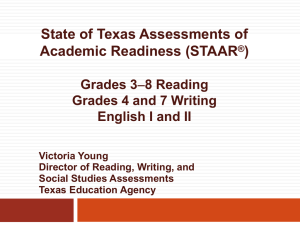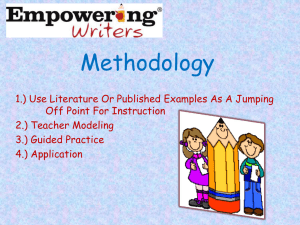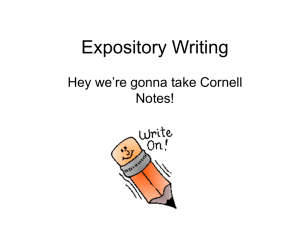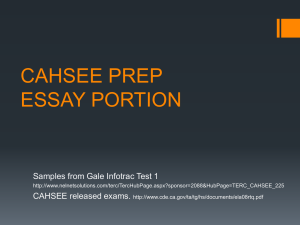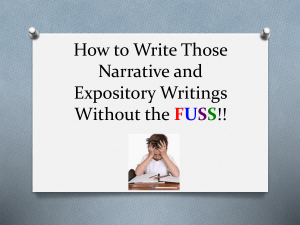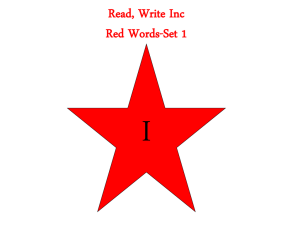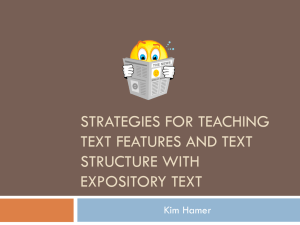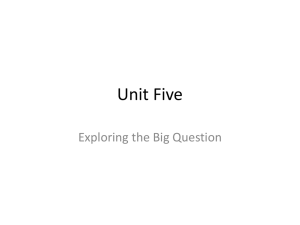ELA Update: TEKS and TAKS
advertisement
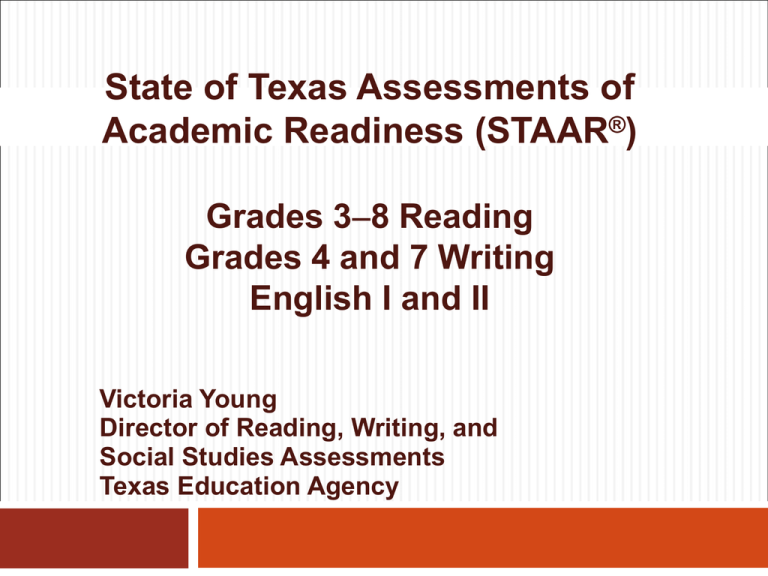
State of Texas Assessments of Academic Readiness (STAAR®) Grades 38 Reading Grades 4 and 7 Writing English I and II Victoria Young Director of Reading, Writing, and Social Studies Assessments Texas Education Agency Grade 4 Expository Statewide Distributions 2013 2014 2 2013 Expository Summed Scores 2014 Expository Summed Scores 1/1 = 2 21% 1/1 = 2 17% 1/2 = 3 17% 1/2 = 3 14% 2/2 = 4 36% 2/2 = 4 38% 2/3 = 5 15% 2/3 = 5 15% 3/3 = 6 8% 3/3 = 6 11% 3/4 = 7 2% 3/4 = 7 3% 4/4 = 8 1% 4/4 = 8 1% Grade 7 Expository Statewide Distributions 2013 2014 3 2013 Expository Summed Scores 2014 Expository Summed Scores 1/1 = 2 10% 1/1 = 2 10% 1/2 = 3 13% 1/2 = 3 13% 2/2 = 4 35% 2/2 = 4 44% 2/3 = 5 21% 2/3 = 5 17% 3/3 = 6 14% 3/3 = 6 10% 3/4 = 7 5% 3/4 = 7 3% 4/4 = 8 2% 4/4 = 8 1% English I Expository Statewide Distributions 2013 2014 (First-time Testers) 4 2013 Expository Summed Scores 2014 Expository Summed Scores 1/1 = 2 18% 1/1 = 2 7% 1/2 = 3 18% 1/2 = 3 8% 2/2 = 4 35% 2/2 = 4 39% 2/3 = 5 14% 2/3 = 5 21% 3/3 = 6 9% 3/3 = 6 18% 3/4 = 7 3% 3/4 = 7 4% 4/4 = 8 1% 4/4 = 8 1% English II Persuasive Statewide Distributions 2013 2014 (First-time Testers) 5 2013 Persuasive Summed Scores 2014 Persuasive Summed Scores 1/1 = 2 4% 1/1 = 2 7% 1/2 = 3 6% 1/2 = 3 9% 2/2 = 4 34% 2/2 = 4 32% 2/3 = 5 23% 2/3 = 5 21% 3/3 = 6 24% 3/3 = 6 20% 3/4 = 7 6% 3/4 = 7 6% 4/4 = 8 2% 4/4 = 8 3% Score Point 2—Basic Writing 6 General Characteristics Essay is generally responsive to the task, but writer often uses organizational strategies that aren’t very effective (e.g., organizing the development in unrelated clusters or using a “flip-side” approach). Controlling idea or position statement is evident, but it is often weak because it is too general or broad to serve as a good central “anchor” for the development. Score Point 2—Basic Writing 7 General Characteristics Writer takes a long time (and often a lot of space) to get into the actual explanation or argument. Some sentences don’t contribute to the development or contribute only marginally. Some connection problems are evident as the writer moves from sentence to sentence or idea to idea (or both)—the result of a variety of writing weaknesses (repetition, wordiness, “out of order” ideas, lack of transitions, perfunctory transitions). Score Point 2—Basic Writing 8 General Characteristics Development is often superficial because the writing is too general, too brief, or too partial. Formulaic approaches also keep the writing from having depth or thoughtfulness. Writer often uses general, imprecise language—which always affects the reader’s ability to understand the point of the writing. Sentences tend to be uncontrolled, and conventions tend to be glitchy. Score Point 2—A Grade 4 Expository Example 9 My favorite place to spend time is school. I like school because you learn and you get to see your friends. My favorite subject in school is science. In science we are learning about African dwarf frogs. Did you know that the frogs have to stay in the water or else they will not survive? I also like social studies. We are learning about the texas cattle drives. Before we got to frogs I appsolutly didn’t know anything about them exept they have long tonges. Now I know a bunch of stuff about frogs. Frogs lay their eggs in a bunch. I think frogs are cool and fun too! I think some teachers get to school at about 6:30 A.M. just to get the day ready for the students. Do you know what I can’t believe is that I don’t think my sister likes school. I love school! Score Point 2—A Grade 7 Expository Example 10 Have you ever laughed at something that was funny? If you have do you think it is important to laugh? Sometimes it is good to laugh like when somebody tells a joke, or does something funny. There are also some things that you don’t laugh at like funerals, car wrecks, and when somebody is in the hospital. It is important to laugh because it shows you have a sense of humor or that you’re not a boring person. People also make you laugh when you are feeling bad about yourself to try to make you cheer up. Sometimes laughing can be a bad thing if you laugh at somebody you can hurt there feelings. It is important to laugh because if you don’t laugh you just go along you’re life feeling sad or mad, always depressed and never having fun. I think people need to laugh sometimes just to have fun. Score Point 2—An English I Expository Example 11 Motivation is the outcome of failure in my eyes. When you fail at something, that should be your cue to motivate to try again till you get it. My motto has always been, “If your not first your last.” Once again nobody is perfect. “Every expert was once a beginner,” says Babe Ruth. Babe Ruth didn’t get baseball right off the back he practiced sometimes failed but failure motivated him to be one of the greatest players to step on a baseball field. The Apollo missions took until the 8 mission to make it. A failure after another but motivation kept them going that’s determination on another Score Point 2—An English I Expository Example 12 level. The scientists behind the missions were not going to the road get bumpy. “Success was the only option, failure’s not,” says Eminem. Lance Armstrong won several Tour de France. Then he was diagnosed with several cancers. Everyone thought failure was coming through his head, but came back to win seven more Tour de France. Not everybody can be Babe Ruth or be in a Apollo mission or be Lance Armstrong. These legends are not perfect they failed at one time in the careers and definitely throughout their lifes. Let motivation over power failure, it can take you a long way. Score Point 2—An English II Persuasive Example 13 Learning something that nearly every person wants to do. Learning is something that cant be taken for granted some people don’t even get to go to school where they live. Yet there are people dropping out and quitting school. I believe that everyone needs a good edjucation it can only lead to good things in your life. Look at some of the important people throughout history who made a difference with their knowledge. For example Albert Einstein a man with a brilliant mind whose theroys and work are still used in teaching to this very day. He is just one example of what a person cand do with Score Point 2—An English II Persuasive Example 14 enough knowledge. Just think of what you can do if you get a good edjucation and try hard enough. For all we know you, me, or anyone could do great things with the knowledge we gain. So all in all get a good edjucation because knowledge truly is power. Reading—The Four Big Skills 15 Understanding Author’s Craft— being able to identify the “tools” an author uses to craft a piece and to pinpoint/ articulate how they affect meaning. Making Connections—being able to make connections both within and across texts at differing levels of depth and complexity (including making connections between a text and its accompanying photograph or procedural piece). Reading—The Four Big Skills 16 Having a Command of Academic Vocabulary—being able to apply the specific academic vocabulary associated with literary and informational reading. Using Text Evidence—being able to “stay inside the text” and find and use text evidence to confirm the validity of an idea both within and across texts. Author’s Craft—Elementary 17 Grade 4 Drama—question 22 The playwright creates a surprise by — *A. giving Carter’s cousin a name that can be used for a boy 57% B. revealing that David can’t play in the tournament 23% C. allowing Sam to make up the rules of the challenge 8% D. having Carter’s cousin come to visit for two weeks 12% Author’s Craft—Middle School 18 Grade 7 Expository—question 20 In paragraph 3, the author uses the example of the 3,000-year-old house in Tanis to — A. prove that satellites are constantly taking photographs to locate ancient cities 22% B. demonstrate that sites once thought to be fictional have been proved to exist 24% *C. emphasize that satellite photography is powerful enough to find a single building 43% D. suggest that previously discovered sites may be much older than originally thought 11% Author’s Craft—High School 19 English I Fiction—question 20 The ball drops to the ground at the boy’s feet. It lies there stunned, quivering, containing flight beneath its smooth skin. Why does the author use personification in this quotation? A. The baseball game symbolizes the love of the family. 8% *B. The description mimics the boy’s disappointment. 60% C. The author is comparing a ball to a bird. 12% D. The author is showing the distance the ball has traveled. 20% Making Connections—Elementary 20 Grade 5 pair—question 38 Bristlecone pines benefit from their roots in the same way that wood frogs benefit from — A. fallen leaves 6% B. the temperature of the environment 28% *C. the ability to freeze 62% D. the other animals in the area 3% Making Connections—Middle School 21 Grade 6 Fiction—question 5 The qualities Brian is described as having in paragraph 6 are most closely related to those associated with the — *A. logical side of Sophie’s mother 52% B. dreamy side of Sophie’s father 6% C. hardheaded side of Sophie 25% D. good side of Uncle Dock 18% Making Connections—High School 22 English II Persuasive—question 48 What does the boxed information on constructive criticism have in common with the reading selection? A. It emphasizes the importance of defending yourself when you have been criticized. 12% B. It reminds readers that different kinds of people respond differently to criticism. 21% *C. It offers specific pieces of advice for the reader to use. 61% D. It employs the viewpoint of a sympathetic firstperson narrator. 5% Academic Vocabulary—Elementary 23 Grade 5 Fiction—question 23 Which sentences best help to create suspense in the story? A. “They’d come to $3.22,” she reported. “Shall I ring them up for you?” 12% *B. I hurried to the school supply station. The pencils were gone. 70% C. I looked toward the counter. She held up a set of pencils. 10% D. I dumped the coins out onto the counter. “Just right,” she announced. 8% Academic Vocabulary—Middle School 24 Grade 6 Drama—question 46 Why are the stage directions at the end of Scene 3 important? *A. They tell the reader that the nightingale abandons the emperor. 56% B. They allow the reader to appreciate the beauty of the mechanical nightingale. 9% C. They help the reader visualize the comfortable surroundings the emperor enjoys. 22% D. They let the reader recognize the difference between the two nightingales. 13% Academic Vocabulary—Middle School 25 Grade 8 Persuasive—question 33 The author supports the article’s premise by providing — A. testimonials from students who have had success with online education 10% *B. examples of how online classes are improving education 70% C. statistics from various schools that offer online classes 16% D. quotations from people who have been involved in organizing online classes 4% Academic Vocabulary—High School 26 English II Poetry—question 40 In the first 12 lines of the poem, the poet uses imagery to describe — *A. a world apart from human culture 64% B. a hostile environment of predators and prey 14% C. an ancient pre-human landscape 7% D. a community of anthropomorphic animals 14% Text Evidence—Elementary 27 Grade 3 Poem—question 28 In the poem, which words help the reader imagine the speaker’s experience — A. And I thought to myself 21% B. those things upon my back 10% *C. with great big trusting eyes 14% D. the cool of the gentle breeze 55% Text Evidence—Middle School 28 Grade 8 Persuasive—question 35 Which sentence supports the belief that online education will be more widespread in the future? A. Students involved in extracurricular activities, those who have been hospitalized, or those who are behind in earning required credits can meet their educational needs though enrollment in online classes. 19% *B. U.S. Education Secretary Arne Duncan believes so strongly in virtual education that he helped budget $500 million for the development of online precollege and college courses over the next 10 years. 59% C. A 2009 Department of Education report suggests that students enrolled in online classes performed better than those in traditional schools. 14% D. This “classroom” experience is far different that anything they did in school. 2% Text Evidence—High School 29 English I Literary Nonfiction—question 48 In which line from the article does the author reveal how she would like others to respond to her lack of hearing? A. I had always hated to be seen as inferior, so I never mentioned my lack of hearing. 20% B. If I tell, people will see only my disability. 15% C. Unlike a wheelchair or a white cane, my disability doesn’t announce itself. 13% *D. It’s a tender part, and you should handle it with care. 51% CONTACT INFORMATION 30 Victoria Young Director of Reading, Writing, and Social Studies Assessments Texas Education Agency 512-463-9536 victoria.young@tea.state.tx.us
